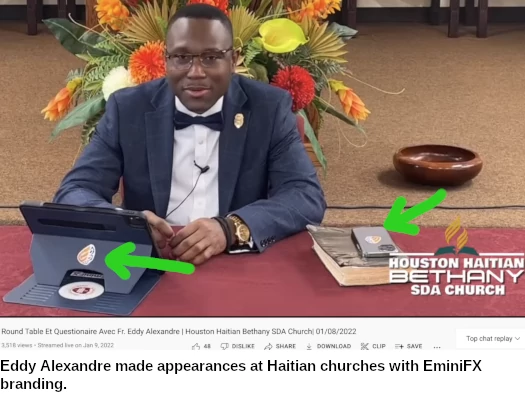
In the meantime his attorney has filed a response to the DOJ’s opposition filing.
The response mostly rehashes the same arguments, but also provides some new information.
The critical issue in modifying Alexandre’s bail release conditions lies with his failure to disclose hidden assets.
Beyond the assurance of a scammer who ran a $59 million dollar Ponzi scheme, there’s nothing stopping Alexandre fleeing the US to live on the tens of millions in crypto he’s suspected of stashing offshore.
Alexandre’s attorney addresses this by falling back on his ties to the US.
The government has already conceded Mr. Alexandre’s significant community ties in the United States based on more than 20 years here.
In fact, the only international travel noted by Pretrial Services was a single trip to Haiti long ago, and a family vacation to Canada.
The point missed here is, now that Alexandre is facing up to thirty years in prison, what he did in the past doesn’t matter.
The lure of fleeing to Dubai or other hidey-holes to live off tens of million in stolen crypto changes the equation.
Also despite cryptocurrency being solely used to hide money by the MLM underbelly, Alexandre’s attorney argues otherwise.
The Court should not credit the government’s suggestion that the use of cryptocurrency is indicative of efforts to hide funds.
In a separate case that allegedly involved the use of at least one foreign cryptocurrency exchange, the Deputy Attorney General characterized criminal use of cryptocurrency as “a futile effort” to “maintain digital anonymity,” and an Assistant Attorney General explained that “we can follow money through the blockchain.”
That’s cool and everything but doesn’t change the fact that MLM scammers use crypto to hide money. BehindMLM’s involuntary shift towards the majority of our coverage featuring cryptocurrency is evidence of this.
As to Alexandre failing to disclose assets, his attorney pulls an Uno reverse card argument.
The government asserts that, generally, such tracing is “difficult.”
The government posits that this is so because hypothetical “users” can establish cryptocurrency accounts “without providing any personal identifying information,” but offers no evidence that Mr. Alexandre opened or maintained accounts in that manner.
The cryptocurrency service providers the government references also appear to be amenable to notice and restraint from the receiver, as well as law enforcement investigative techniques ranging from subpoenas and search warrants for U.S.-based entities to letters rogatory and Mutual Legal Assistance Treaty requests for foreign service providers.
In other words, the government, the CFTC, and the receiver can obtain the information they seek regarding Mr. Alexandre’s assets without requiring him to waive the Fifth Amendment, and they have the power to prevent Mr. Alexandre from accessing these assets.
They have had ample time to do so, beginning with the onset of the investigation and continuing after Mr. Alexandre was arrested on May
Thus, the proposed modified conditions are reasonable in light of the restrictions arising from the parallel CFTC action.
Right. Let’s just ignore Alexandre not meeting his bail conditions and blow a ton of money and resources on attempting to locate and freeze his assets, which could be held by anyone under any name anywhere.
Solid.
With respect to Alexandre not providing financial disclosures, he responds by doubling down;
Restraints by the CFTC and the receiver. Instead, the government seeks a modification of its own.
Whereas the Court set a bail condition requiring Mr. Alexandre to disclose his personal “crypto currency accounts,” the government argues that he should be required to provide a “full accounting of his current assets.”
Notwithstanding Mr. Alexandre’s decision to refrain from providing financial information in connection with his presentment, Pretrial Services recommended that bail conditions be set without further disclosures.
Neither condition is necessary under the circumstances of this case and the parallel enforcement action, and Mr. Alexandre should not be required to choose between invoking his privilege against self-incrimination and pretrial liberty subject to the modified conditions he has proposed.
I’ve bolded where these arguments fall apart.
Pretrial Services recommended disclosures weren’t recommended on the set bail conditions. If you modify those bail conditions, what Pretrial services did or didn’t recommend under a different set of conditions is moot.
It’s up to the courts to swallow Alexandre’s arguments or not, but in the meantime the last thing we in the response filing is that Alexandre is still in prison.
On May 24, despite emails to the MDC Legal Department regarding the planned visit, counsel was denied access to Mr. Alexandre upon arrival at the facility based on the explanation that Mr. Alexandre was subject to a quarantine.
Pending a decision on Alexandre’s bail condition change motion, stay tuned…
Update 27th May 2022 – Eddie Alexandre has prevailed in getting his bail release conditions modified.
Upon release, Alexandre will not require 24/7 monitoring by a security guard. All other previously set bail conditions remain in place.
